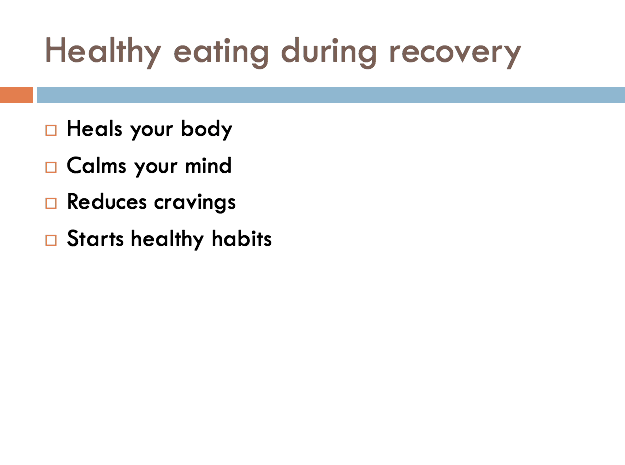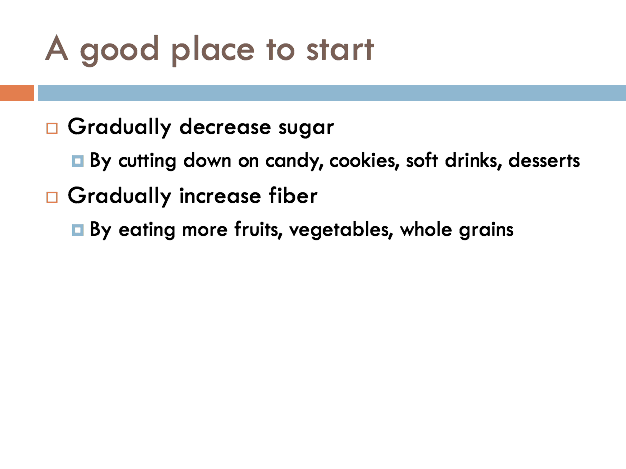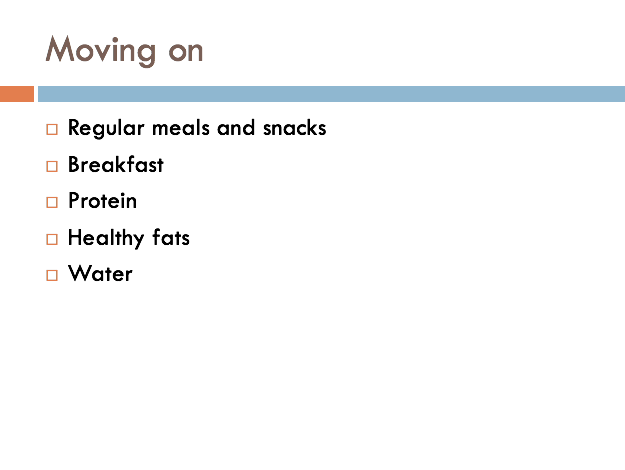Nutrition to Promote Healing
My team and I have just added a few fantastic new PowerPoints to the gold professional members' PowerPoint library! Today I'd like to share a few slides from one of our newest additions. This presentation is called Substance Abuse and Nutrition: Healthy Eating for Recovery.
A healthy eating pattern during recovery helps you feel better physically and mentally. It will help:
- Heal your body from damage done by drugs and alcohol, build your immune system back up, and start to treat medical conditions (both ones that you may have had prior to addiction and ones caused by the substance abuse).
- Calm your mind, help with your mood, anxiety, depression, and energy level.
- Reduce cravings for drugs and alcohol, and make you less likely to confuse hunger with cravings for your drug of choice.
- Start healthy habits for the self-care and lifestyle changes that will enhance recovery.
Talking about and thinking about a healthy diet can be overwhelming. For most people in recovery, a good place to start your journey to healthy eating is sugar and fiber. Your goal is to gradually cut down on sugary foods (like cake, cookies, candy, and soft drinks) while gradually eating more foods that contain fiber (fruits, veggies, and whole grains). “Gradually” is key here. We’re talking baby steps!
Once you’re getting in the habit of skipping the sugary foods and eating more fruits, veggies, and whole grains, it’s time to move on to other healthy eating habits, like eating regular meals and snacks, including breakfast; eating enough good protein foods and healthy fats; and drinking more water.
Don’t worry—you don’t have to work on everything all at once! Remember, small changes will add up. Something relatively simple, like choosing to drink water instead of soda just once a day, is a success and will help you on your journey toward a healthier lifestyle.
And that's where we're going to end this tiny excerpt of the in-depth presentation we've put together.
Want to see more? If you already have a Gold Professional Membership, then simply drop by the PowerPoint Archive! If you don't have a membership yet, check out the options here or just sign up today!
Note: The information in this presentation is appropriate for people in recovery who have gone through detox. There is no standard as to when to start educating the recovering addict about nutrition. Some treatment centers wait until the 30 day mark to address healthy eating. David Wiss, MS, RDN, who works with recovering addicts (https://www.nutritioninrecovery.com), recommends working on gradually increasing fiber and decreasing sugar for the first six weeks before moving on to a well-rounded healthy eating focus. While a healthy diet is an important, and often overlooked, part of the recovery process, there is a fine line between encouraging healthy eating and putting too much pressure on an addict during the difficult early days of abstinence. Recovering addicts are at risk for disordered eating, so the focus should be on positive eating habits and small changes, not lots of restrictions.
This presentation uses the term “substance abuse” broadly. Unless otherwise noted, we are referring to Alcohol Use Disorder (AUD) and Substance Use Disorders (SUD).





